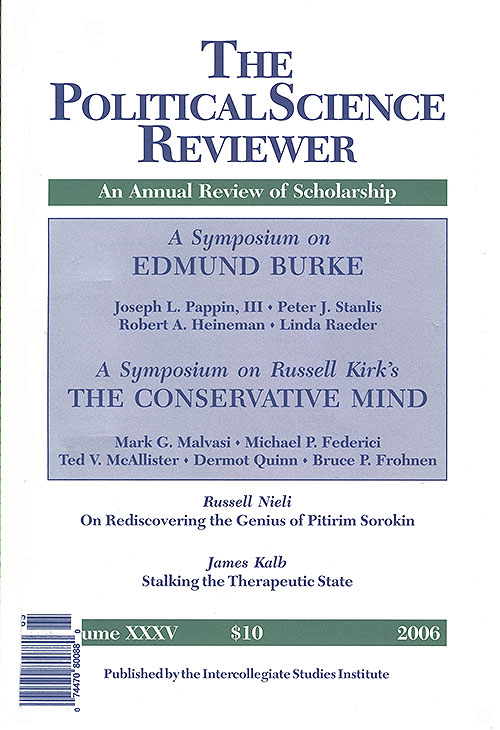Keywords
How to Cite
Abstract
Edmund Burke is recognized by most modern conservatives asthe founding father of conservative political philosophy. Infact, it is practically inescapable for those who claim to beconservatives that they recognize Burke as the fountainhead ofconservatism. For the most part the Reflections on the Revolutionin France is cited as the seminal text, with its emphasis uponorder, custom, just prejudice, historical precedent, and prescriptiverights in the face of radical Jacobinism. Burke's rage againstthe French philosophes such as Rousseau, Voltaire, and Diderotwas in large part due to their rejection of religion, property, andconstitutional monarchy and their embrace of fanatical atheism,as he regarded their ultimate foundation. Burke's stance, based onsolid principles of justice and tradition, and also reflecting naturalsentiments of respect for the manners and habits of an orderedsociety, seems to have a transparency that is clear to all.
Similar Articles
- Linda C Raeder, Edmund Burke , The Political Science Reviewer: Vol. 35 (2006): Symposia on Edmund Burke and on Russell Kirk’s <em>The Conservative Mind</em>
- Burke A. Hendrix, Edmund Burke, Native Americans, and the Burkean Imagination , The Political Science Reviewer: Vol. 42 No. 1 (2018): Symposium: Philosophy in Weimar Germany
- Ross Carroll, Edmund Burke, Imperialist Ideologue? , The Political Science Reviewer: Vol. 42 No. 1 (2018): Symposium: Philosophy in Weimar Germany
- Lida Maxwell, Burke, Cultural Difference, and the Problem of Imperial Critique , The Political Science Reviewer: Vol. 42 No. 1 (2018): Symposium: Philosophy in Weimar Germany
- Ted V McAllister, What Does Burke Have to Do With America? , The Political Science Reviewer: Vol. 40 (2016): A Symposium on Paul Gottfried’s Conservatism in America
- Brandon Turner, O’Neill on Burke’s Not-Particularly- Conservative Logic of Empire , The Political Science Reviewer: Vol. 42 No. 1 (2018): Symposium: Philosophy in Weimar Germany
- Onur Ulas Ince, Political Economy and Edmund Burke’s (Il)Liberal Logic of Empire , The Political Science Reviewer: Vol. 42 No. 1 (2018): Symposium: Philosophy in Weimar Germany
- Robert A Heineman, Edmund Burke and the American Nation , The Political Science Reviewer: Vol. 35 (2006): Symposia on Edmund Burke and on Russell Kirk’s <em>The Conservative Mind</em>
- William F Byrne, Edmund Burke and the Politics of Empire , The Political Science Reviewer: Vol. 37 (2008): Symposium: The Life and Work of Michael Polanyi
- Onur Ulas Ince, Burke A. Hendrix, Lida Maxwell, Ross Carroll, Brandon Turner, Daniel I. O’Neill, Author Meets Critics , The Political Science Reviewer: Vol. 42 No. 1 (2018): Symposium: Philosophy in Weimar Germany
You may also start an advanced similarity search for this article.
Most read articles by the same author(s)
- Marc D Guerra, Leo Strauss and the Recovery of the Theologico-Political Problem , The Political Science Reviewer: Vol. 36 (2007): A Symposium on Leo Strauss and His Students
- Walter B Mead, Learning from the Insights and the Errors of a Great Mind , The Political Science Reviewer: Vol. 34 (2005): Eric Voegelin’s <em>New Science of Politics</em>: A 50th Anniversary Symposium
- James Kalb, Stalking the Therapeutic State , The Political Science Reviewer: Vol. 35 (2006): Symposia on Edmund Burke and on Russell Kirk’s <em>The Conservative Mind</em>
- Joseph T Stuart, Introduction , The Political Science Reviewer: Vol. 41 No. 2 (2017): Symposium: The Life and Work of Christopher Dawson
- Paul Seaton, “Political Philosophy in the Strict Sense” , The Political Science Reviewer: Vol. 36 (2007): A Symposium on Leo Strauss and His Students
- Ted V McAllister, The Particular and the Universal , The Political Science Reviewer: Vol. 35 (2006): Symposia on Edmund Burke and on Russell Kirk’s <em>The Conservative Mind</em>
- Stephen A McKnight, Symposium: Eric Voegelin’s New Science of Politics , The Political Science Reviewer: Vol. 34 (2005): Eric Voegelin’s <em>New Science of Politics</em>: A 50th Anniversary Symposium
- Ronald J Terchek, Positive Political Theory and Heresthetics , The Political Science Reviewer: Vol. 13 (1983): Reviews
- John Heyking, David Walsh’s Anamnesis of Modernity , The Political Science Reviewer: Vol. 39 (2010): Symposia on American Constitutionalism and on Religion & Politics
- Verlan Lewis, Foundational Ideas in the Political Thought of F. A. Hayek , The Political Science Reviewer: Vol. 45 No. 1 (2021): Symposium: Music in Plato's Political Thought
